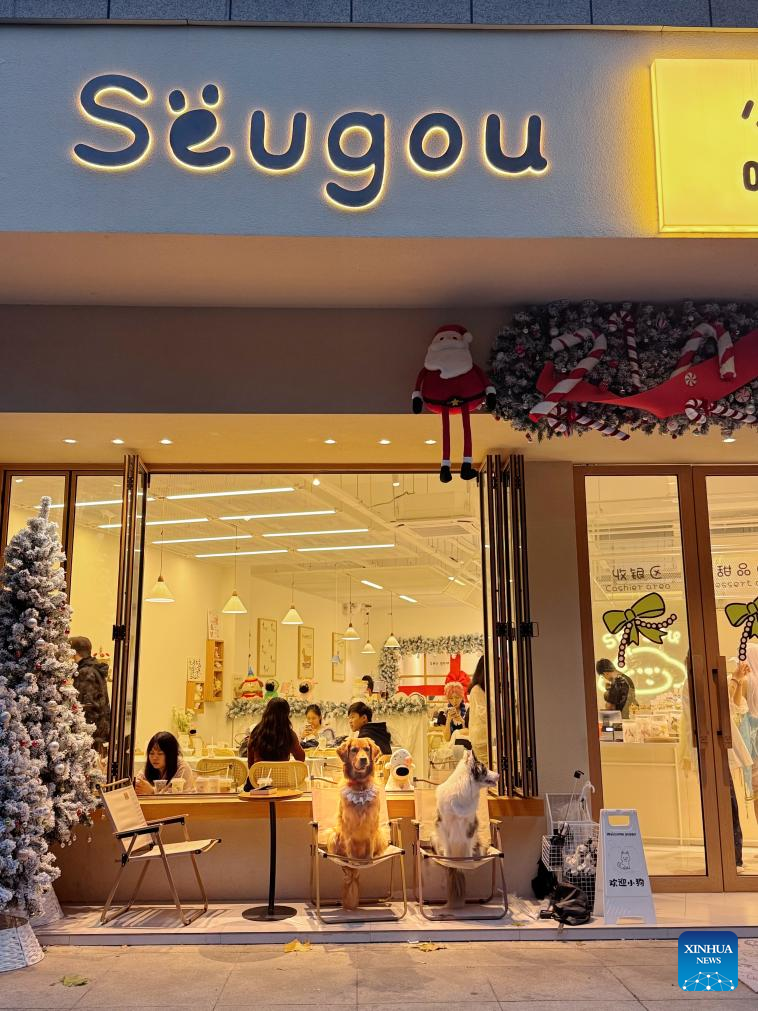
This photo taken on Oct. 19, 2024 shows a dog cafe in Hangzhou, east China's Zhejiang Province. (Xinhua)
BEIJING, Oct. 25 (Xinhua) -- With the pet population soaring and the pet economy flourishing in China, a wave of pet cafes has surged across the country, offering popular retreats where visitors can unwind while mingling with adorable animals.
Data from Qichacha, a leading platform offering company information inquiry services, shows that there are currently over 3,500 cat cafe-related companies and more than 200 dog cafe-related businesses in China.
Kwak Nakyung, a 24-year-old international student from the Republic of Korea, visits a stray cat cafe in Beijing twice a week with her friends. She is particularly drawn to a feline named Nainai.
"It is a quiet, clean and healing space," Kwak said. "I learned that many of the cats there are rescued strays, and it warms my heart to see them living better lives." She typically orders a cup of coffee and a dessert, while enjoying a relaxing afternoon in the company of the cats.
The cafe Kwak visits is named Paw Infinity -- which has rescued nearly 30 stray cats since opening in June this year. "We have seen a steady stream of customers," said Ye Jian, the cafe's owner. "Some come for the soothing presence of the cats, while others visit to donate food or adopt them."
"All the cats here are vaccinated, and we ensure they are treated with respect. We share details of each cat's personality with our guests, letting them know which ones enjoy being cuddled or fed," said Ye. He added that the cafe's revenue directly supports the adoption and care of the cats.
With the "adopt, don't shop" philosophy gaining traction, cafes focusing on stray animal adoption are becoming a growing trend in China. "It's a mutual healing process that benefits both people and animals," said Han Zihao, another Beijing cat cafe owner who has adopted over 60 stray or abandoned cats.
Han noted that, unlike traditional stray animal rescue stations, which are often located in suburban areas and lack a stable income, stray animal cafes leverage commercialization to attract more visitors and generate consistent revenue. This sustainable model helps ensure the long-term growth and stability of rescue efforts.
Han used to visit cat cafes in Japan, where the industry is well-established and thriving. He learned about the management model, including providing shoe covers and setting rules for customers interacting with the cats.
Notably, dog cafes in China are also attracting growing interest, thanks to their energetic and lively atmospheres.
When Cheng Danni goes to work, her one-and-a-half-year-old golden retriever is sent to a nearby dog cafe in Hangzhou, capital of east China's Zhejiang Province, where it has a "part-time job."
"It is a vibrant place where my dog can get good care and make friends with other dogs. The dog does not feel lonely anymore," said the 20-year-old, who had earlier discovered an advertisement seeking dog "staff" on Xiaohongshu, a Chinese lifestyle-sharing platform.
"This is actually a new type of foster care service that requires no payment from either side. The lovely dogs help attract more customers," said Chen Yajie, owner of the dog cafe which has over 30 canine "staff members." She added that the cafe offers customers a package that includes a 90-minute interactive experience with the dogs and a cup of coffee.
According to Chen, each dog must pass an interview before joining the cafe staff, which involves checking their vaccination records and deworming status, as well as assessing their temperament and social skills.
"Rapid acceleration of urbanization has led to a faster pace of life and increased stress. Pet cafes provide close interaction with animals, helping address the growing need for spiritual comfort," said Wu Yi, an associate professor at the College of Animal Science and Technology at China Agricultural University.
Wu noted that the boom in pet cafes reflects a growing acceptance and love for pets in Chinese society and highlights the thriving pet industry. According to an industry report, the urban pet (dogs and cats) consumption market grew to 279.3 billion yuan (about 39.29 billion U.S. dollars) in 2023, up 3.2 percent from 2022, and is projected to climb to 361.3 billion yuan by 2026.
Wu also emphasized the need for sound standards and regulations concerning pet cafe sanitation and environments. Additionally, staff must be well trained in terms of pet nutrition and behavior, as well as the handling of emergencies, to ensure animals receive proper care and treatment. ■

Kwak Nakyung (1st L), holding a feline named Nainai, chats with friends at a stray cat cafe named Paw Infinity in Beijing, capital of China, Oct. 19, 2024. (Xinhua/Wang Yihan)

This photo taken on Oct. 19, 2024 shows the golden retriever of Cheng Danni and other dogs at a dog cafe in Hangzhou, capital of east China's Zhejiang Province. (Xinhua)



